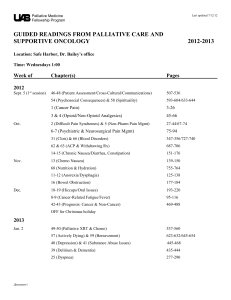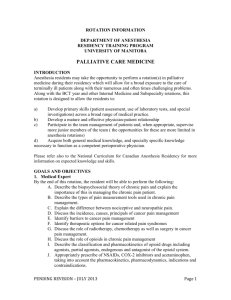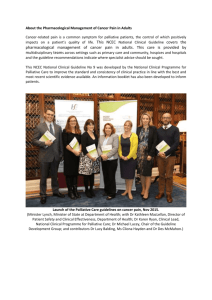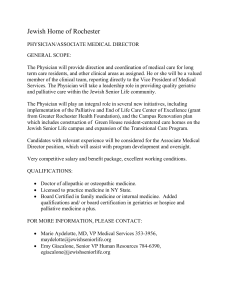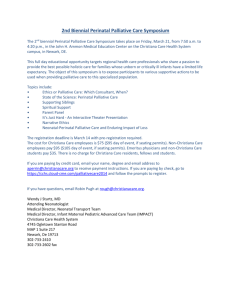Palliative Medicine Rotation for
advertisement
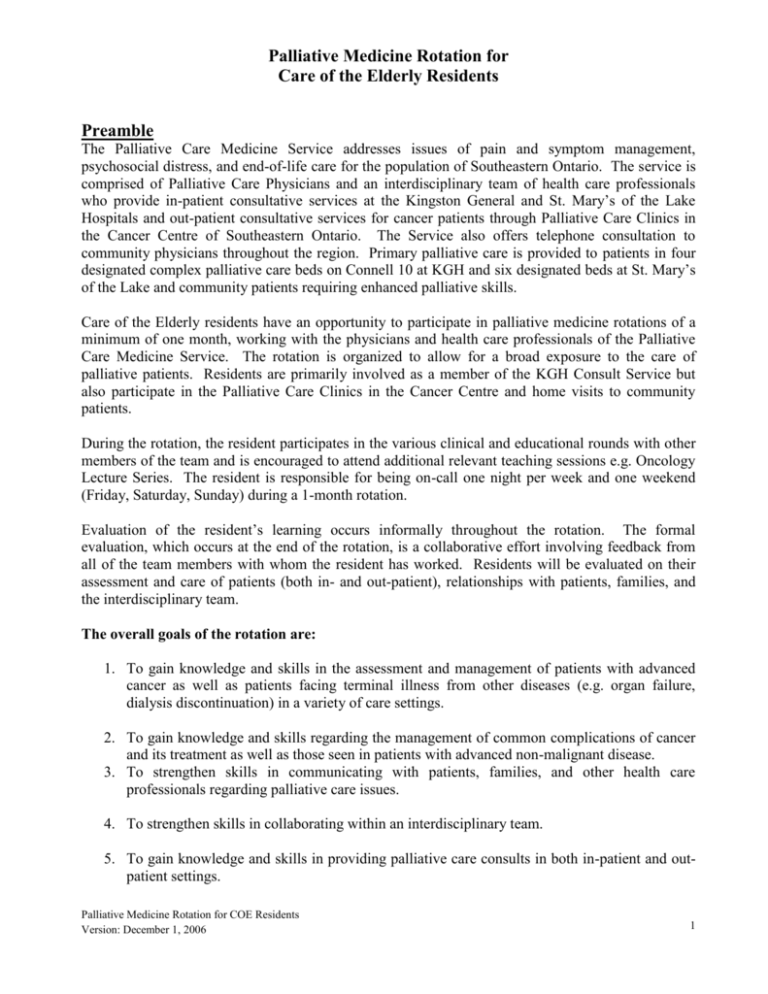
Palliative Medicine Rotation for Care of the Elderly Residents Preamble The Palliative Care Medicine Service addresses issues of pain and symptom management, psychosocial distress, and end-of-life care for the population of Southeastern Ontario. The service is comprised of Palliative Care Physicians and an interdisciplinary team of health care professionals who provide in-patient consultative services at the Kingston General and St. Mary’s of the Lake Hospitals and out-patient consultative services for cancer patients through Palliative Care Clinics in the Cancer Centre of Southeastern Ontario. The Service also offers telephone consultation to community physicians throughout the region. Primary palliative care is provided to patients in four designated complex palliative care beds on Connell 10 at KGH and six designated beds at St. Mary’s of the Lake and community patients requiring enhanced palliative skills. Care of the Elderly residents have an opportunity to participate in palliative medicine rotations of a minimum of one month, working with the physicians and health care professionals of the Palliative Care Medicine Service. The rotation is organized to allow for a broad exposure to the care of palliative patients. Residents are primarily involved as a member of the KGH Consult Service but also participate in the Palliative Care Clinics in the Cancer Centre and home visits to community patients. During the rotation, the resident participates in the various clinical and educational rounds with other members of the team and is encouraged to attend additional relevant teaching sessions e.g. Oncology Lecture Series. The resident is responsible for being on-call one night per week and one weekend (Friday, Saturday, Sunday) during a 1-month rotation. Evaluation of the resident’s learning occurs informally throughout the rotation. The formal evaluation, which occurs at the end of the rotation, is a collaborative effort involving feedback from all of the team members with whom the resident has worked. Residents will be evaluated on their assessment and care of patients (both in- and out-patient), relationships with patients, families, and the interdisciplinary team. The overall goals of the rotation are: 1. To gain knowledge and skills in the assessment and management of patients with advanced cancer as well as patients facing terminal illness from other diseases (e.g. organ failure, dialysis discontinuation) in a variety of care settings. 2. To gain knowledge and skills regarding the management of common complications of cancer and its treatment as well as those seen in patients with advanced non-malignant disease. 3. To strengthen skills in communicating with patients, families, and other health care professionals regarding palliative care issues. 4. To strengthen skills in collaborating within an interdisciplinary team. 5. To gain knowledge and skills in providing palliative care consults in both in-patient and outpatient settings. Palliative Medicine Rotation for COE Residents Version: December 1, 2006 1 Educational Objectives I. The Family Physician is a Skilled Clinician General Objective 1: The resident will be able to demonstrate effective knowledge, skills and attitudes in dealing with the complex interplay of physical, psychological, social and spiritual needs of palliative patients and their families. Specific objectives: The resident will be able to: 1. identify the underlying causes/contributing factors of common distressing symptoms e.g. pain, nausea and vomiting, constipation, dyspnea, delirium. 2. manage pain effectively including the use of opioid analgesics, adjuvant medications, and non-pharmacological adjuncts with appropriate alteration in strategies for elderly patients. 3. manage other physical symptoms including dyspnea, delirium, nausea, vomiting, constipation using both pharmacological and non-pharmacological strategies. 4. recognize and manage those symptoms/conditions requiring urgent interventions in the palliative care setting e.g. spinal cord compression, hypercalcemia, superior vena cava obstruction, severe acute onset/exacerbation of symptoms. 5. identify psychological, social, and spiritual issues confronting palliative patients and demonstrate strategies for addressing them. 6. recognize, analyze and address ethical issues confronted by palliative patients (e.g. withdrawal of treatment; discontinuation of life support; discussing and dealing with conflict around goals of care; oral or parenteral feeding and hydration). 7. Demonstrate awareness of the effects of physiological changes of aging and co-morbidities on management of pain and other symptoms seen in palliative care 8. adapt communication style to the patient’s and family’s personal, educational, and cultural background. 9. demonstrate skills in working with the families of dying patients, facilitating family communication and problem solving. 10. demonstrate skills in providing educational counseling to dying patients and their families. 11. identify the elements of patient and family grief reactions and utilize effective techniques and resources to prevent the development of pathological reactions. General Objective 2: The resident will be able to participate as an effective member of an interdisciplinary team. Specific objectives: The resident will be able to: 1. describe the roles of other disciplines in providing palliative care. 2. effectively collaborate with members of the interdisciplinary team to optimize patient care. 3. demonstrate effective consultation and communication skills when working with referring physicians and services. II. Family Medicine is Community-Based General Objective 1: The resident will be able to demonstrate knowledge and skills in Palliative Medicine Rotation for COE Residents Version: December 1, 2006 2 managing patients in different settings of care. Specific Objectives: The resident will be able to: 1. describe the roles of the family physician and specialist in the care of palliative patients. 2. identify and discuss issues related to setting of care (e.g. home, hospital, palliative care unit), resources and coordination that affect need for admission, ability to provide care, and discharges. 3. effectively assess and manage palliative patients in hospital, clinic, and community settings. 4. describe the local and specialized resources available to patients in the community and the planning required to be able to discharge patients to a home/community setting from hospital. 5. demonstrate the judicious use of health care resources. 6. effectively utilize and communicate with community agencies. III. The Family Physician is a Resource to a Defined Practice Population General Objective 1: The resident will be able to demonstrate the ability to incorporate accepted standards of care and evidence-based decision-making in caring for palliative patients and their families. Specific objectives: The resident will be able to: 1. describe models of palliative care delivery and current standards of practice 2. develop a preventive approach to managing patient and family expectations and needs. 3. critically apply knowledge from the medical literature to patient care. 4. demonstrate skills in self-directed learning. 5. demonstrate skills in educating patients and families concerning palliative and end-of-life issues. 6. maintain organized and effective medical records. 7. demonstrate effective management of time. IV. The Doctor-Patient Relationship is Central to the Role of Family Physician General Objective: The resident will be able to demonstrate a whole person (patientcentred) approach to caring for palliative patients and their families. Specific objectives: The resident will be able to: 1. describe the nature of suffering and how patients may respond to illness. 2. shift their focus of care toward quality of life rather than prolongation and cure of disease. 3. facilitate patient control by ensuring that all interventions are guided by their needs, goals and desires, and beliefs. 4. demonstrate awareness of their own personal issues and concerns, strengths and limitations, when caring for palliative patients. 5. recognize and respond to issues where advocacy is appropriate. 6. demonstrate professional and ethical behavior. 7. discuss the impact of aging on the patient and families experience of death and dying Palliative Medicine Rotation for COE Residents Version: December 1, 2006 3



